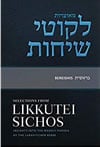ב"ה
Selections from Likkutei Sichos - Bereishit
Insights into the Weekly Parshah by the Lubavitcher Rebbe
|
Likkutei Sichos, Volume 10, Bereishis, Sicha 2
Light fascinates and intrigues. Plants are drawn to light, and people also seek it out. Anyone who goes out on a sunny day after a few days of clouds and fog will tell you that the sun’s rays are inviting and invigorating. Why it has that effect we do not know, but the energy it generates is almost tangible.
|
|
Likkutei Sichos, Volume 10, Bereishis, Sicha 1
The way a writer opens his work reveals much about his fundamental thrust and intent. This is certainly true when speaking about a Torah giant like Rashi, whose precise choice of wording has attracted the careful attention of scholars over the course of history.
|
|
Likkutei Sichos, Volume 15, Bereishis, Sicha 3
Any parent who has deliberated over the choice of a name for his or her child appreciates how significant names are. As the Midrash emphasizes, the ability to give a name is a unique potential vested in mankind, a sign that man’s wisdom surpasses that of the angels. However, the Rebbe highlights ithat more than merely reflecting man’s intellectual and spiritual capacities, this potential mandates a mission.
|
|
Likkutei Sichos, Volume 15, Noach, Sicha 2
In the sixties and seventies, a topic that was frequently featured in Jewish journals and public discussions was whether there was a conflict between Torah and science. In a world where scientific breakthroughs were rapidly changing the complexion of day-to-day life, there were those in the Torah community who felt on the defensive, as if they had to justify clinging to a tradition that had originated thousands of years earlier.
|
|
Likkutei Sichos, Volume 1, Noach, Sicha 1
From early childhood on, we have been taught the story of Avraham breaking his father’s idols and his self-sacrifice in spreading the awareness of G‑d in Ur Kasdim. Why then is this story not told – or even directly hinted at – in the Written Torah?
|
|
Likkutei Sichos, Volume 30, Noach, Sicha 1
There is an age-old argument regarding the stories of the Tanach. There are those outside the Torah tradition who maintain that they are mere allegories, told with the intent of imparting lessons. Conversely, the Torah world upholds the validity of the Tanach’s narratives, postulating that the stories describe events that happened exactly as told. A genuine Torah perspective combines both approaches.
|
|
Likkutei Sichos, Volume 25, Sicha 1
From early childhood on, we have been taught the story of Avraham breaking his father’s idols and his self-sacrifice in spreading the awareness of G‑d. Why is this story not told – or even directly hinted at – in the Written Torah?
|
|
Likkutei Sichos, Volume 1, Lech Lecha, Sicha 1
Avraham had two sons: Yishmael and Yitzchak. From the contrast between them, we can derive lessons fundamental to parenting, and learn that the greatest nachas, satisfaction, parents derive from their children is seeing them continuing their legacy.
|
|
Likkutei Sichos, Volume 15, Lech Lecha, Sicha 3
The sequence of the first three parshiyos of the Torah reflect three different epochs in the world’s spiritual history.
|
|
Likkutei Sichos, Volume 20, Sicha 3
Martyrdom has, unfortunately, been a feature of the Jews’ Divine service over the course of history. However, on the surface, this phenomenon is not unique to our people. Many others have sacrificed their lives for their faiths, ideals, and values. Is there any difference between a Jew’s self-sacrifice and that of a non-Jew?
|
|
Likkutei Sichos, Volume 3, Vayeira
Throughout the 1950s, the Jewish world was still smarting from the wounds of the Holocaust. In those trying years, the Rebbe cultivated a forward-looking orientation, focusing on Jewish youth and how to groom them to take leadership
roles in promoting Jewish identity and education.
|
|
Likkutei Sichos, Volume 25, Vayeira, Sicha 3
What is better: establishing a bond with G‑d based on your knowledge, understanding, and will, or accepting such a bond with simple faith, without considering one’s own will or thought?
|
|
Likkutei Sichos, Volume 3
The Sages’ describe Sarah as a paradigm of a righteous person who “was perfect and whose years were perfect.” Why was Sarah chosen as the exemplar of one who possessed these two qualities, what is implied by the Sages’ use of the term “perfect,” and why did our Sages associate a righteous person’s inner perfection with the perfection of their years.
|
|
Likkutei Sichos, Volume 20, Chayei Sarah, Sicha 3
We all pray. At times, we see our prayers answered on this physical plane. However, there is usually an interval between the time we offer our supplications and the manifestation of G‑d’s response.
|
|
Likkutei Sichos, Volume 15, Chayei Sarah, Sicha 3
Every Jewish woman and girl, even a young child at the age of three who kindles the Shabbos lights, possesses a great power that even Avraham and Yitzchak’s Shabbos lights did not have.
|
|
Likkutei Sichos, Volume 25, Sicha 2
There are two Torah readings that begin in a similar manner with the words "Toldos," Parshas Noach and Parshas Toldos. Why is it that specifically this Torah reading is called Toldos?
|
|
Likkutei Sichos, Volume 30, Toldos 1
Abraham and Isaac were polar opposites. One was outgoing and charismatic. The other was more introverted. Nevertheless, they looked alike. Not only were they father and son, G‑d miraculously caused their facial countenances to resemble each other’s perfectly.
|
|
Likkutei Sichos, Volume 30, Toldos 3
The Patriarchs lived rich, involved, and long lives, performing a variety of activities and interacting with many people. Nevertheless, the Chumash describes only a tiny fraction of these activities.
|
|
Likkutei Sichos, Volume 30, Sicha 2
The Yissachar-Zevulun relationship is a frequently highlighted theme in Torah literature. The tribe of Zevulun would be involved in commercial activity and would provide for Yissachar in order that the latter could occupy themselves with Torah study. But who’s work was actually more lofty?
|
|
Likkutei Sichos, Volume 15, Vayeitzei 3
This talk discusses the importance of serving G‑d with bittul (selflessness) and how involving oneself with the lowest dimensions of this material world and refining them fulfills G‑d’s purpose for creation, establishing a dwelling for Him in our material world.
|
|
Likkutei Sichos, Volume 15, Vayeitzei 4
One of the first terms a person being introduced to the thought system of Chabad encounters is bittul. However, the meaning of the term – and the application of the concept – is often misunderstood. Generally, bittul is translated as “self-nullification.” The intent, however, is not that a person feel that he is “nothing,” devoid of self-worth.
|
|
Likkutei Sichos, Volume 35, Vayishlach Sicha 3
“It is the duty of chassidic women and girls to stand in the front line of every activity [that seeks] to strengthen the observance of Yiddishkeit.” This excerpt from a letter, written back in 5696 (1936), reflects a trend that was developed and grew under the Rebbe’s leadership – empowering of Jewish women and urging them to emerge from the background of society and to utilize their Divinely-endowed talents.
|
|
Likkutei Sichos, Volume 3, Vayishlach
Names are significant. They reveal the inner nature of the person or people called by that name. The Jewish people are called by two names, Yaakov and Yisrael. Each of these names has a distinct meaning and significance.
|
|
Likkutei Sichos, Volume 3, Vayeishev
Long before Freud and others spoke of the significance of dreams, our Sages understood that dreams teach volumes about who a person is, what his aspirations are, and what his future may be. Here, the Rebbe analyzes Yosef’s dreams and explains the lessons that can be derived from them, not only for him but for the Jewish people for all time.
|
|
Likkutei Sichos, Volume 35, Vayeishev 1
Yaakov was “awaiting and looking forward to” what every Jew awaits and looks forward to – the Ultimate Redemption, the Redemption of the Jews from exile for all time. Yaakov “awaited and looked forward to” the reign of the Mashiach from the House of Yosef, who will come as an initial step preparatory to the coming of the Mashiach from the House of David.
This was Yaakov’s hope, and this remains the desire and wish of all his descendants.
|
|
Likkutei Sichos, Volume 15, Vayeishev, Sicha 2
“Yaakov sought to dwell in tranquility.” This quote from the Midrash resonates within everyone. Who would't not want to live together with his children and grandchildren in a serene setting, unperturbed by material worries, with a chance to focus on higher truths and values and share them with his family. This desire is not merely a personal quest, but a reflection of G‑d’s desire for a dwelling in the lower realms. But what does a dwelling for G‑d on this material plane mean?
|
|
Likkutei Sichos, Volume 30, Mikeitz, Sicha 2
The Torah reading relates that after Yosef’s brothers expressed remorse for selling Yosef, Reuven tells them, “Didn’t I tell you…, ‘Do not sin against the youth,’ but you did not listen? Behold, his blood, too, is being demanded!” Seemingly, Reuven’s words are out of place. Why would he cause his brothers further pain and increase the weight of their guilt?
|
|
Likkutei Sichos, Volume 10, Mikeitz 1
Why, after becoming viceroy in Egypt, did Yosef not contact his father? Many other Torah commentaries offer explanations for this issue, but Rashi does not address it at all!
|
|
Likkutei Sichos, Volume 1, Mikeitz
In a dream, anything can happen. When a person is awake, his mind functions with order and structure; there are logical limits and patterns. But when dreaming, there are no bounds to his imagination and he can fantasize the impossible – the impossible good, but also the opposite.
|
|
Likkutei Sichos, Volume 10, Vayigash, Sicha 1
When is it appropriate to cry, and when one must roll up one’s sleeves and take action?
|
|
Likkutei Sichos, Volume 30, Vayigash 2
When Yosef wanted to assure his father that he was alive, he sent wagons hinting at the passage of "eglah arufah", the decapitated calf, the last subject Yaakov and Yosef had studied together. Yaakov understood the full depth of the communication Yosef had sent him and rejoiced. Yosef was not only informing Yaakov that he was alive; he was clarifying to him that he was still firmly adhering to his righteousness and Torah knowledge. He was spiritually alive.
|
|
Likkutei Sichos, Volume 5, Vayigash 2
Yosef’s conduct toward his brothers blazed a path and empowered all Jews for all time. He granted them the potential to look at another Jew, not as he appears externally, but rather as he exists from the standpoint of his essence, that he is “an actual part of G‑d.” Therefore, one should “sustain him according to his deeds” and “repay those who are culpable with goodness.”
|
|
Likkutei Sichos, Volume 20, Vayechi, Sicha 1
Imagine if the Jews who lived through the Holocaust or the Khmelnitsky pogroms had learned that Mashiach would not come in their time. What would they have felt?
|
|
Likkutei Sichos, Volume 15, Vayechi 2
Ephraim and Menashe can be seen as prototypes for two types of Jews,. Menashe is the Jew for whom “his father’s house,” the old country, is a reality, while Ephraim knows only “the land of my oppression,” the new land into which he was born and in whose culture he lives.
|
Related Topics
- Likkutei Sichot (2124)
- Lubavitcher Rebbe (384)




